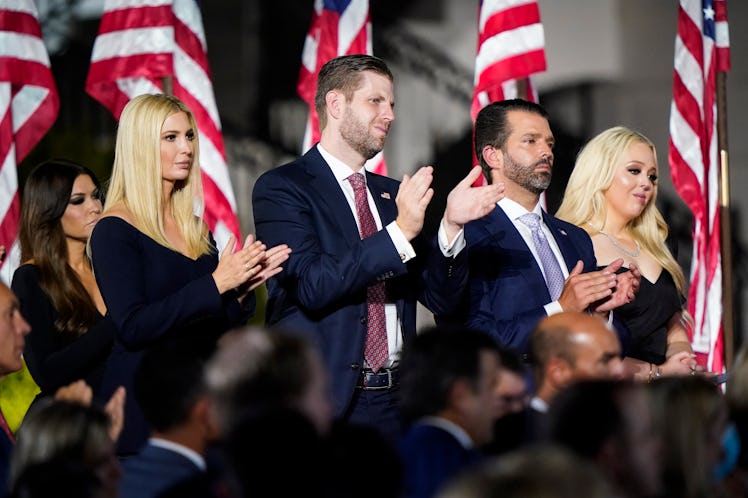
Trump May Be Planning To "Pre-Emptively" Pardon His Kids
Since the start of his term in 2017, President Donald Trump has enjoyed the immense power of his position. But recently, based on various sources, it seems as though he's focused on one power in particular: his pardoning privileges. After granting former national security adviser Michael Flynn a pardon on Nov. 25, the president has reportedly discussed doing the same for other members of his circle, per The New York Times. In fact, Trump may be planning to "pre-emptively" pardon his kids, along with his son-in-law Jared Kushner and personal lawyer Rudy Giuliani. Asked about the reports, the White House did not immediately respond to Elite Daily's request for comment on the possibility of pardons.
As Trump enters the final stages of his one-term presidency, there's been plenty of public discussion about whether Trump — who has been accused of a variety of misconduct and impeached, though never formally charged — could be arrested or charged after he leaves office. There's also a potential risk for his close associates, who may end up in the crossfire as well. Because of a long-standing opinion from the Office of Legal Counsel (OLC), part of the Department of Justice, a president is essentially immune to legal prosecution while in office. However, come Jan. 20, when Trump will formally leave office, both he and his inner circle are vulnerable to indictment.
There have been multiple reports alleging Trump has consulted advisers on the possibility of granting pre-emptive pardons to his friends, family, and possibly even himself. His eldest three children, Donald Jr., Eric, and Ivanka, along with Kushner and Giuliani, have all been brought up as potential recipients of a pardon, although it's not entirely clear what any pardon would be for. The White House did not immediately respond to Elite Daily's request for comment on the potential criminal misconduct these individuals may be pardoned for. As of publication, neither Trump, his children and their spouses, nor Giuliani have been charged with any crimes.
In the past, the Trump clan has been investigated on several allegations. However, none have resulted in any formal charges so far, and many remain ongoing. The Trump campaign has also been the subject of multiple investigations into alleged financial misconduct, which representatives have denied, while Trump himself has been accused of sexual misconduct by roughly two dozen women, which he and the White House have also denied. These investigations do not include the lingering accusations of obstruction of justice during the investigation into possible collusion with Russia in the 2016 election, which the president has denied, but an investigation into the situation expressly did not exonerate Trump. When it comes to the president's children, there are questions about tax irregularities, communications with Russians during the 2016 election, and misleading information on government security clearances.
While a pre-emptive pardon may sound unusual, it's not unprecedented. Essentially, a pre-emptive pardon means an alleged crime is forgiven before any official legal proceedings have begun. In fact, after Richard Nixon resigned from the presidency in 1974, he was granted an — unusually broad — pre-emptive pardon by Gerald Ford for "all offenses" he may have committed during his presidency, which effectively gave Nixon a clean slate despite his role in the Watergate Scandal.
The president has also asserted via Twitter that he has the "absolute right" to pardon himself. However, another OLC opinion suggests the president cannot pardon himself because "no one may be a judge in his own case," meaning Trump may run into some difficulty following through on that particular claim. However, experts state that it's legally plausible for the president to grant pardons to members of his closest inner circle.
Still, a president's pardoning powers have limits — a president can only pardon federal crimes, not state-level crimes. So even with a federal pardon, the Trump family's time in the legal spotlight isn't guaranteed to be over.